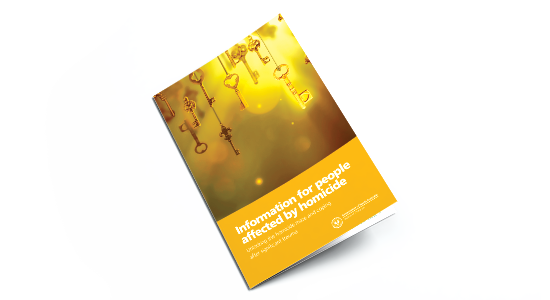Losing a loved one to murder or manslaughter is an extremely traumatic experience.
Families and friends will usually have to deal with a lot of different people involved in the police investigation, court proceedings and the prison system.
A lot of different people are involved in a homicide investigation.
Major crime investigations
Police will need to collect evidence from the crime scene. This could be your home or involve your possessions or forensic material.
In a major crime like a homicide, there are a lot of different police officers who will be involved in the early investigation - the police are usually the first on the scene.
- Major Crime Investigators – a specialist homicide investigation unit
- Victim Contact Officers – police officers who provide information on support services and resources available
- Local Area Investigators – investigators from the local police area where the offence took place who work closely with Major Crimes
- Crime Scene Investigations – police officers who collect and examine evidence at the scene
- Pathologists – special scientists from Forensic Science SA who examine the victim’s body and surrounding area
- Uniform police patrols - these police attend the crime scene to assist the investigators
- Ambulance officers – ambulance officers attend and examine the victim’s body, usually before the pathologist gets there
In any homicide case, a post-mortem will need to take place to help establish the cause of death.
It will usually take at least a week before this happens and the victim’s body can be released. It can sometimes take longer.
After this, you can then apply to Births Deaths and Marriages for a death certificate. You will need a death certificate to finalise a person’s estate.
Planning a funeral
Most families prefer to speak directly with funeral homes to organise a funeral. It can be helpful to ask around about cost, as this can vary a lot.
If you don’t know where to start, speak with your Victim Contact Officer from SAPOL or the Commissioner for Victims’ Rights.
The funeral director will be able to help you make arrangements.
You may also be eligible for compensation to cover the cost of the funeral.
Dealing with trauma
Coping with trauma is different for everyone.
The impacts of crime can be overwhelming and difficult to overcome - there are a range of professional support services that can help you.
Unsolved homicides
In some cases, the person who committed the murder may not be found – even after police have exhausted all the avenues of an investigation.
Homicide cases that are not solved within 12 months are often called ‘cold case homicides’.
This means that all available lines of enquiry have been exhausted at that time – it does not mean the case has been filed or forgotten. Police will continue to investigate and review the crime for new evidence.
There are some times when a homicide might not ever be solved. This can be particularly hard to deal with, but it’s important to know the police never stop investigating a case.
Getting support
There are a number of formal and informal services that can help you deal with your grief.
The Homicide Victim Support Group is a self-help group made up of individuals and families who have been affected by or suffered the loss of a family member or friend through homicide.


